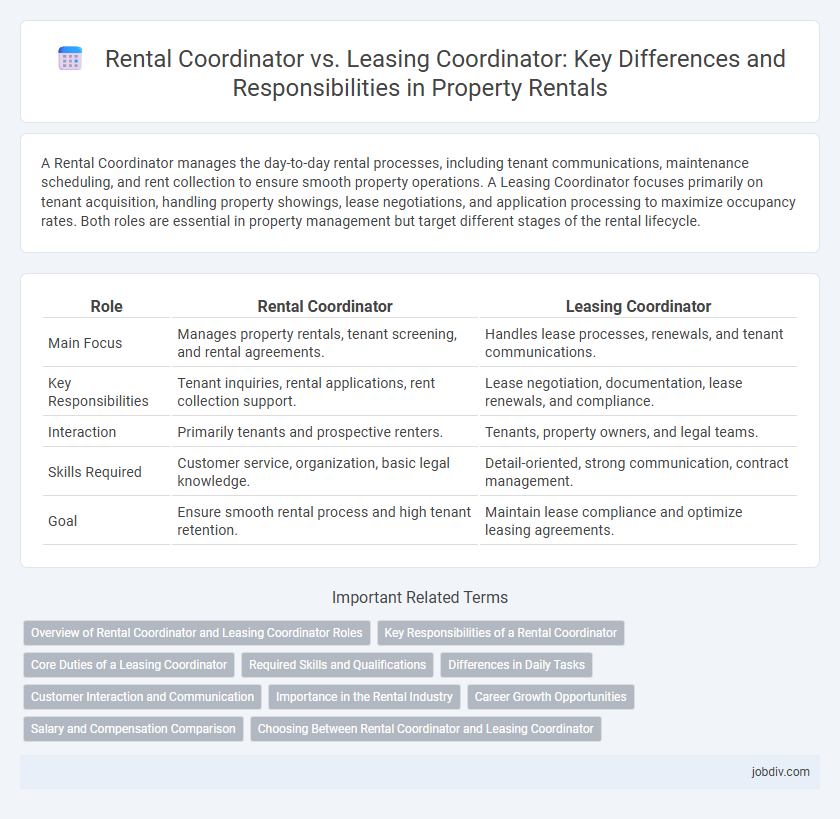A Rental Coordinator manages the day-to-day rental processes, including tenant communications, maintenance scheduling, and rent collection to ensure smooth property operations. A Leasing Coordinator focuses primarily on tenant acquisition, handling property showings, lease negotiations, and application processing to maximize occupancy rates. Both roles are essential in property management but target different stages of the rental lifecycle.
Table of Comparison
| Role | Rental Coordinator | Leasing Coordinator |
|---|---|---|
| Main Focus | Manages property rentals, tenant screening, and rental agreements. | Handles lease processes, renewals, and tenant communications. |
| Key Responsibilities | Tenant inquiries, rental applications, rent collection support. | Lease negotiation, documentation, lease renewals, and compliance. |
| Interaction | Primarily tenants and prospective renters. | Tenants, property owners, and legal teams. |
| Skills Required | Customer service, organization, basic legal knowledge. | Detail-oriented, strong communication, contract management. |
| Goal | Ensure smooth rental process and high tenant retention. | Maintain lease compliance and optimize leasing agreements. |
Overview of Rental Coordinator and Leasing Coordinator Roles
Rental Coordinators manage property maintenance schedules, tenant communications, and rental payment processing to ensure smooth daily operations. Leasing Coordinators focus on marketing available units, conducting property tours, and facilitating lease agreements to maximize occupancy rates. Both roles collaborate to enhance tenant satisfaction and optimize property revenue.
Key Responsibilities of a Rental Coordinator
Rental Coordinators manage tenant communications, coordinate property showings, and handle lease agreement preparations to ensure smooth rental processes. They oversee application screenings, rent collections, and maintenance requests, acting as a liaison between landlords and tenants. Their role focuses on operational efficiency and tenant satisfaction within residential or commercial rental properties.
Core Duties of a Leasing Coordinator
A Leasing Coordinator primarily manages tenant applications, conducts background checks, and coordinates lease signing processes to ensure smooth occupancy transitions. They maintain accurate leasing records, handle tenant inquiries, and collaborate closely with property managers to maximize rental income. Core duties emphasize tenant relations and lease administration, distinguishing them from Rental Coordinators who often focus more on property maintenance scheduling.
Required Skills and Qualifications
Rental Coordinators require strong organizational skills, attention to detail, and proficiency in property management software to efficiently handle tenant applications and payments. Leasing Coordinators need excellent communication abilities, knowledge of leasing laws, and negotiation skills to manage lease agreements and maintain landlord-tenant relationships. Both roles benefit from experience in customer service, multitasking, and administrative functions within the real estate rental industry.
Differences in Daily Tasks
A Rental Coordinator primarily manages tenant applications, processes payments, and coordinates move-ins and move-outs to ensure smooth occupancy transitions. In contrast, a Leasing Coordinator focuses on marketing properties, conducting property showings, and preparing lease agreements to attract and secure new tenants. While both roles support property management, the Rental Coordinator emphasizes administrative support and tenant relations, whereas the Leasing Coordinator drives leasing activities and vacancy reduction.
Customer Interaction and Communication
Rental Coordinators primarily manage tenant inquiries, coordinate property viewings, and facilitate smooth communication between landlords and tenants to ensure a positive rental experience. Leasing Coordinators focus on guiding prospective tenants through the application process, explaining lease terms, and maintaining clear communication to secure lease agreements efficiently. Both roles demand strong customer interaction skills, but Rental Coordinators emphasize ongoing tenant support, while Leasing Coordinators concentrate on initial tenant engagement and contract facilitation.
Importance in the Rental Industry
Rental Coordinators manage tenant relations, lease documentation, and property maintenance schedules to ensure smooth rental operations, playing a crucial role in tenant satisfaction and retention. Leasing Coordinators focus on marketing rental properties, screening potential tenants, and facilitating lease agreements to maximize occupancy rates and revenue. Both positions are essential in the rental industry for maintaining operational efficiency, minimizing vacancies, and enhancing overall property management success.
Career Growth Opportunities
Rental Coordinators manage tenant relationships and property maintenance, gaining essential operational experience that opens pathways to property management roles. Leasing Coordinators focus on marketing rental units and tenant acquisition, developing skills in sales and customer service that can lead to leasing management or real estate sales careers. Both roles offer distinct career growth opportunities within the real estate industry, with transferable skills that support advancement into higher management positions.
Salary and Compensation Comparison
Rental Coordinators typically earn a median salary ranging from $40,000 to $55,000 annually, while Leasing Coordinators' salaries usually fall between $45,000 and $60,000, reflecting their direct involvement in tenant agreements. Compensation packages for Leasing Coordinators often include performance-based bonuses and commission incentives tied to lease closures, enhancing total earnings. Rental Coordinators may receive standard benefits but less frequently benefit from commission structures, leading to a difference in overall compensation between the two roles.
Choosing Between Rental Coordinator and Leasing Coordinator
Choosing between a Rental Coordinator and a Leasing Coordinator depends on the property management needs, as Rental Coordinators primarily handle short-term rental agreements and tenant communications, while Leasing Coordinators focus on long-term lease negotiations and contract management. Rental Coordinators are essential for properties with high turnover rates, offering efficient rental processing and documentation, whereas Leasing Coordinators ensure compliance with leasing regulations and facilitate tenant onboarding for extended stays. Understanding the scope of responsibilities and the rental duration preference helps property managers make an informed decision between the two roles.
Rental Coordinator vs Leasing Coordinator Infographic

 jobdiv.com
jobdiv.com